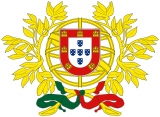
Back سياسة البرتغال Arabic Палітыка Партугаліі BE Държавно устройство на Португалия Bulgarian Politický systém Portugalska Czech Politisches System Portugals German Πολιτική της Πορτογαλίας Greek Politiko de Portugalio EO Politique au Portugal French Politica del Portogallo Italian პორტუგალიის პოლიტიკა KA
 |
|---|
| Constitution |
Politics in Portugal operates as a unitary multi-party semi-presidential representative democratic republic, whereby the Prime Minister of Portugal is the head of government, and the President of Portugal is the non-executive head of state which, although it is a somewhat ceremonial figure,[1] has some significant political powers they exercise often.[2] Executive power is exercised by the Government, whose leader is the prime minister. Legislative power is primarily vested in the Assembly of the Republic (the Portuguese parliament), although the government is also able to legislate on certain matters.[3] The Judiciary of Portugal is independent of the executive and the legislature. The President exerts a sort of "moderating power", not easily classified into any of the traditional three branches of government.[2]
Since 1975, the party system has been dominated by the social democratic Socialist Party and the liberal-conservative Social Democratic Party, but in the 2024 snap elections, the far-right Chega managed to achieve 21% of seats in the Assembly of the Republic.
According to the V-Dem Democracy Indices Portugal was, in 2023, the 20th most electoral democratic country in the world.[4]
- ^ "Portugal profile - Leaders". BBC. 7 March 2017. Retrieved 8 July 2023.
- ^ a b Duties of the President – Head of State. Official Page of the Presidency of the Portuguese Republic. Retrieved 7 September 2021.
- ^ The Assembleia da República as a body that exercises sovereign power. Assembleia da República. Retrieved 7 September 2021.
- ^ V-Dem Institute (2023). "The V-Dem Dataset". Retrieved 14 October 2023.